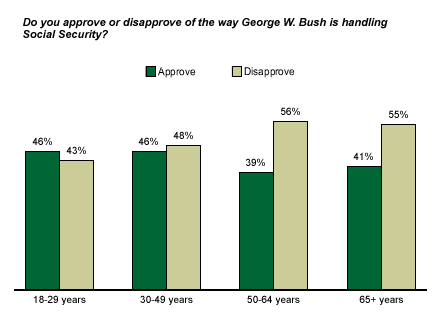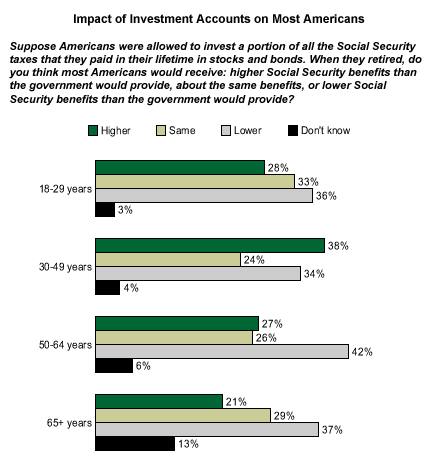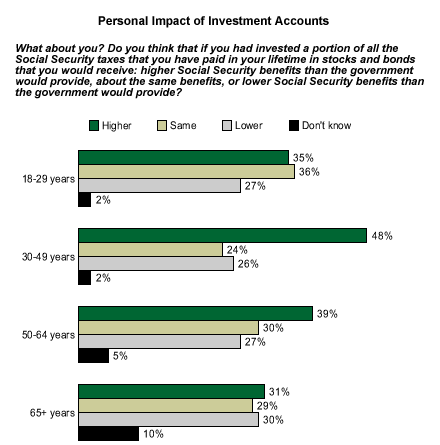It's been well documented that younger Americans are more likely than older Americans to support President Bush's proposed changes to Social Security, which would allow people to put a portion of their Social Security benefits into private investment accounts. When Gallup asked Americans in a recent poll* whether they approve or disapprove of Bush's approach to Social Security, Americans under 50 are divided, while those aged 50 and older are far more negative about it. The 18- to 29-year-old age group is the only one with a higher percentage in approval than in dissent.

Will Investment Accounts Yield Higher Returns?
To some extent, the difference may reflect the younger generation's greater opportunity to compound stock market returns over a longer period, and thus withstand extended periods of potential negative returns. But could the difference also reflect greater optimism about the power of the stock market?
It doesn't look that way. Eighteen- to 29-year-olds are not the most optimistic age group when asked whether investing Social Security taxes in private accounts would yield higher benefits for Americans than what the current government system provides. A plurality (36%) of 18- to 29-year-olds think most Americans would receive lower benefits from private investments than the current system provides (33% of young adults think people would receive the same benefits either way, and 28% think private accounts would yield higher benefits for most Americans).
On the other hand, a plurality (38%) of adults between the ages of 30 and 49 think most Americans would get higher benefits through investing in personal accounts (only 24% think benefits would be the same and 34% think benefits would be lower. Americans 50 and older are at least as negative if not more so than 18- to 29-year-olds regarding the benefits that the proposed private system would yield.

Gallup also asked how people think they might fare personally if they could invest their Social Security taxes rather than remaining in the current system. Americans are much more optimistic about their ability to get better returns investing their Social Security taxes than what they feel most Americans could get. But again, adults aged 30 to 49 are most optimistic -- nearly twice as many in this age group think they would receive higher returns (48%) as think they would receive lower returns (26%).

Why are Americans between 30 and 49, who are the most optimistic about that they personally (as well as most Americans) could get higher Social Security payments by privately investing their taxes still as likely to oppose Bush's plan as to favor it? The sense of security among 30- to 49-year-olds may have waned; Gallup's 2004 Personal Finances survey found they are considerably less likely than 18- to 29-year-olds to feel their monthly savings -- or their income -- will increase over the next six months.
Bottom Line
In a way, thirtysomethings and fortysomethings are the first "401(k) generation," more accustomed to making their own personal investment decisions for retirement, rather than relying on guaranteed pensions. Living and working through a great bull run of the 1990s, they may have a great sense of the market's power to produce superior returns over the long haul. However, the inclination against investment in place of guaranteed benefits highlights the appeal of a nationwide safety net immune to the vagaries of the stock market -- a system that remains true to the name "Social Security."
*Results are based on telephone interviews with 1,010 national adults, aged 18 and older, conducted Feb, 4-6, 2005. For results based on interviews with 112 18- to 29-year-olds, one can say with 95% confidence that the margin of error is ±9 percentage points. For results based on interviews with 367 30- to 49-year-olds, one can say with 95% confidence that the margin of error is ±5 percentage points. For results based on interviews with 279 50- to 64-year-olds or 240 adults 65 and older, one can say with 95% confidence that the margin of error is ±6 percentage points.

